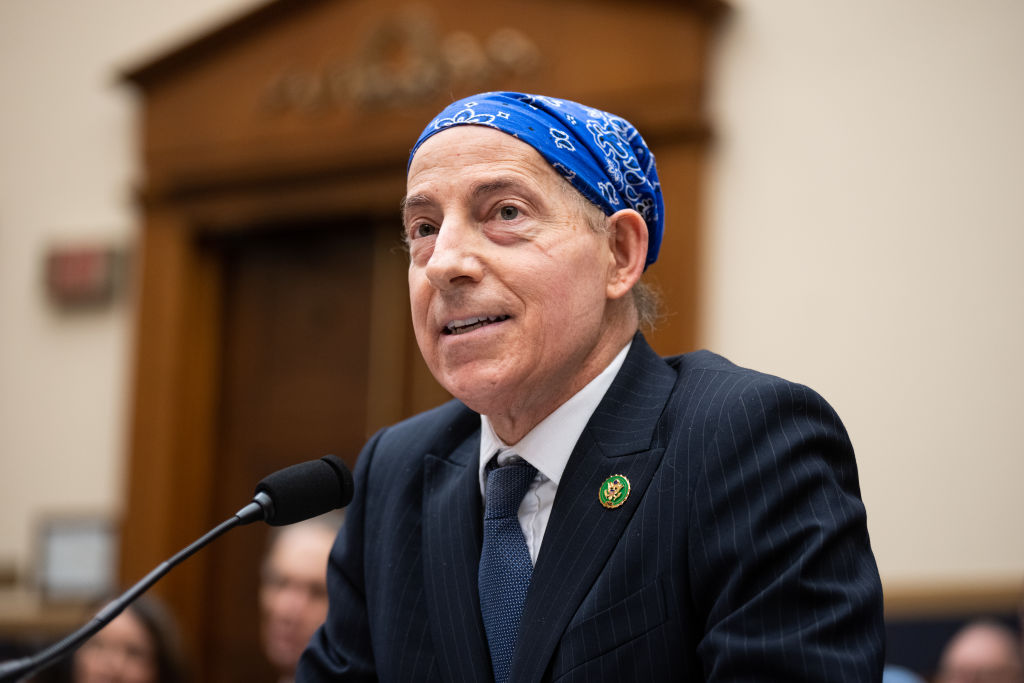
Rep. Jamie Raskin, a Maryland Democrat, will spend the rest of the month deciding whether he will run for U.S. Senate, in what is already shaping up to be a crowded primary battle to replace outgoing Democratic Sen. Ben Cardin.
“After five months of chemo, I am taking the month of May to seriously investigate the 2024 election, the Senate, the House, and the role I can best play in Democratic victory and progress in the country,” Raskin tells TIME.
The liberal icon who was the impeachment manager for former President Donald Trump’s second impeachment and who served on the historic Jan. 6 Committee said last week that his cancer has entered remission after chemotherapy treatment following a lymphoma diagnosis in December.
Cardin announced his retirement on Monday after serving 16 years in the upper chamber. If Raskin, 60, enters the race, he will join a packed field vying for the open Senate post, a rarity in Maryland politics. Two of the state’s most recent former Senators—Paul Sarbanes and Barbara Mikulski—held their seats for 30 years.
More from TIME
There are already three candidates officially in the race to replace Cardin: U.S. Rep. David Trone and Montgomery County Council Member Will Jawando, both Democrats, and socialist philosopher Jerome Segal, a perennial figure on the ballot in Maryland in recent years, have launched their Democratic primary bids. Both Jawando and Segal are mounting longshot crusades, and Jawando has already said that he would instead run for Raskin’s House seat if Raskin runs for Senate, according to multiple sources familiar with the matter. Prince George’s County Executive Angela Alsobrooks is also expected to announce her campaign for the Senate seat in the coming days.
Trone announced his campaign on Thursday morning with a news release and video. A wealthy businessman who founded the Total Wine and More retail chain, he has a history of self-funding his campaigns. The 67-year-old legislator is likely to pour even more of his personal fortune into his quest to clinch the coveted Senate seat. Trone has told associates that he plans to spend as much as $50 million of his own money on the campaign, according to sources familiar with the matter.
Trone’s spending wasn’t enough for him to beat Raskin once before. In 2016, Raskin defeated Trone in the Democratic primary to replace Chris Van Hollen when he vacated his House seat to run for Senate. Raskin raised and spent roughly $1 million on that contest compared to the roughly $17 million Trone injected from his own pocket. (Trone won a House seat in an adjacent Maryland district two years later.)
But the decision to give up a House seat for a Senate run is more complicated for Raskin than Trone. Raskin, a former law professor, has not only just surmounted a months-long health struggle—he just attained a major perch as the top Democrat on the powerful House Oversight Committee. That makes him first in line to take the gavel if his party wins back control of the chamber—the same post that another beloved Maryland Democrat, the late Elijah Cummings, held in the Trump years until his death. It also means that Raskin is the leading House Democrat going toe-to-toe with Rep. James Comer of Kentucky, the committee’s chair, who has been using the panel to launch investigations into Hunter Biden and the Biden Administration. At the same time, Raskin is currently the organizing chair of the Democratic Congressional Campaign Committee, for which he orchestrates the recruitment of young party activists, punctuated by the Democracy Summer Project he founded five years ago.
Trone, on the other hand, doesn’t have a leadership position in the House, where he sits on the Budget and Appropriations committees.
But his ability to self-fund is creating a dynamic that is putting pressure on other candidates to get their fundraising started quickly. Raskin can operate on a longer timeline, however, in part because he already has a federal campaign account with millions of dollars on hand—and because of his rock-star status among the party, with a national profile that will enable him to raise millions more nationwide.
The other likely prominent candidate, Alsobrooks, would be starting her fundraising operation from scratch. Campaign finance laws forbid her from transferring money from her state account into a federal account. But she is poised to have a strong base of support from her home community of Prince George’s County, which holds the most Democratic voters in the state. She also has a compelling story as a Black woman and single parent that would surely galvanize national interest. If Alsobrooks runs, she will be doing so at a time when there are no women in Maryland’s Congressional delegation—and no Black women in the U.S. Senate.
If Raskin jumps in, the Senate contest would likely become a three-way competition between him, Alsobrooks, and Trone, setting up a lively Democratic primary, and perhaps one of the most expensive in the country.
More Must-Reads from TIME
- Cybersecurity Experts Are Sounding the Alarm on DOGE
- Meet the 2025 Women of the Year
- The Harsh Truth About Disability Inclusion
- Why Do More Young Adults Have Cancer?
- Colman Domingo Leads With Radical Love
- How to Get Better at Doing Things Alone
- Michelle Zauner Stares Down the Darkness
Contact us at letters@time.com